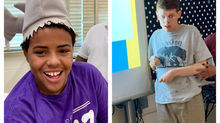#highexpectations
- Lisa Mihalich Quinn
- Nov 7, 2016
- 3 min read
Updated: Apr 22, 2021

This is important. You can do this. I won't give up on you. Effective effort leads to achievement.
Anyone who teaches in the large public school system where I do will immediately recognize these four key messages. They are drilled into teachers at new educator orientation. There was a time, about ten years ago, when they were mandatory classroom decoration. They became part of the cache of words stored deep in the recesses of your brain that you found tumbling from your mouth when you had a student in tears over decoding, shredding a difficult math paper, or, as sometimes happens, vomiting from anxiety in a trash can in the corner of your classroom.
Our new superintendent, in his message to teachers and the community at large at the beginning of this school year, talked about our school system's excellent student outcomes, despite being such a large, diverse county: "This success is due, in large part, to a highly talented staff of educators, administrators, and support professionals who are committed to ensuring student achievement at every grade and level." High expectations for ALL. Preach! I can get on board with that.
So why do many people at the top, the ones who should be guiding teachers and helping reinforce these key messages, seem to discredit this message so loudly?

About a month ago, I set out in search of some materials I had used at another school when including students with Down syndrome in a co-taught science class. Mostly, I modified our county's materials specifically for these students, providing simplified language, using Picture Communication Symbols (PCS) to enhance text, and making questions into multiple choice and fill-in-the-blank sentences. Occasionally, I turned to pre-modified materials like the one shown here that aligned with our lessons and also saved me a boatload of time. Knowing these were expensive materials my current school didn't own, I asked how I could borrow them from another school.
I got a response from an 'instructional specialist,' someone in the upper echelons of special education in our school system, informing me that the modified materials I was requesting to use with my students are not appropriate for elementary aged students with significant cognitive disabilities. She also drew the conclusion that based on my questions, I must be a new teacher and clearly need more training in how to instruct the most significantly disabled students in our county.
Wait, what? What happened to high expectations for ALL students?
You'll notice that this happened a month ago. I've had to wait a month to write this post because I spent days seething. Even now, I feel the rage boiling inside. It's the white-hot anger that drives teachers out of the classroom and to write open letters or blog posts about why they are abandoning the career they chose and pursued with passion. Just this morning I read Elona Schreiner's blogpost "The One Reason I Quit Teaching" in which she writes about her inability to continue working in a system that had no time to address childhood hunger in the classroom. This anger is widespread among teachers. It's a big reason we lose so many before their fifth year of teaching.
How dare you?
How dare you, person who has never met my students - for whom I write unique individualized education plans - make a blanket statement that says instructional materials are not appropriate for them?
How dare you, person who has never seen me teach, assume that I am a new teacher because I asked for materials that my school does not have?
How dare you, person who represents our school system of over 157,000 students and speaks for our special education population, so blatantly ignore the core values of setting high expectations for ALL learners?
The mother of one of the students with Down syndrome I supported in my co-taught science class shared a snippet from her latest IEP meeting. The science content teacher's notes at the meeting talked about the materials and instruction I provided and said, "I was blown away by what she [the student] was able to access in my class." Her mom has said it is the best general education academic experience she's had at that school.
Another part of our superintendent's message was that "each student brings his or her own unique set of experiences and interests to the classroom each day and I believe it is our responsibility as a school system to unite them with a common thread of literacy, writing, and mathematics skills that will give them the opportunity to succeed and options to pursue any path they choose in life."
But by making gross presumptions about a certain group's competencies, don't we deprive them of those opportunities before they're even offered?
---
Are you looking for help understanding how to adapt age appropriate academics for non-speaking students? Our Accessible Academics course can help!




















.png)




.png)

